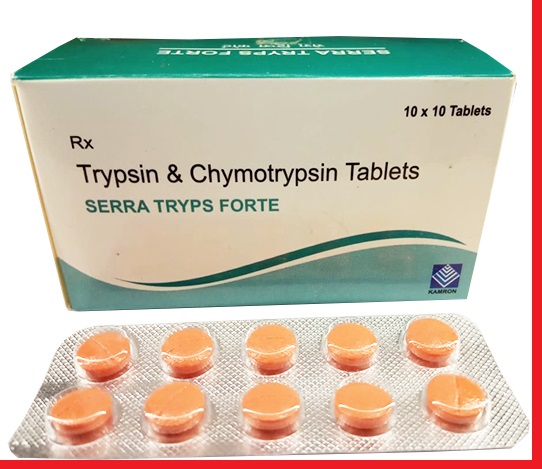Table of Contents
What is Trypsin Chymotrypsin?
Trypsin Chymotrypsin is useful for treating pain and swelling in the affected area. This drug breaks up proteins into smaller pieces so the bloodstream can quickly absorb them. After the blood is absorbed, more blood is in the area that hurts and swells.
Trypsin Chymotrypsi can also help with pain and swelling caused by inflammatory diseases and wounds that have just been operated on. If you have kidney or liver disease, you should talk to your doctor before taking this medicine. Taking this medicine at least 30 minutes before a meal is best.
Trypsin Chymotrypsin Safe for Uses
It is safe to take this medicine for a short time. Your doctor will tell you how much and how long to take. Unless your doctor tells you not to, you should take it. Before having surgery, you should stop taking this drug because it might affect how your blood clots.
You should not take it if you know you are allergic to any of the drug’s parts. You should always inform your doctor if you are pregnant or breastfeeding. Also, don’t take more than the recommended dose because that can increase the chance of side effects.
The information here is based on how much salt the medicine has. The medicine may be used and have different effects on different people. Before using this medicine, you should talk to a Derma.
Trypsin-Chymotrypsin is a combination medicine that is usually used to treat swelling. It is a drug that reduces inflammation and fights free radicals. It can ease the pain and swelling caused by blood clots in the tissues. It helps reduce severe pain and swelling after surgery in wounds that are already inflamed.
Because it has enzymes like trypsin and chymotrypsin, it helps the body digest food and take in protein and other nutrients.
What are Trypsin and Chymotrypsin Used for?
Trypsin Chymotrypsin helps the body absorb protein by breaking it into smaller pieces. This reduces pain and brings more blood to the areas that are swollen. It makes it easier for the body to break down protein and absorb important nutrients. Trypsin and chymotrypsin are used to treat the following diseases:
- Postsurgical pain
- Swollen muscle injuries
- Dead or dying tissue
- Long-term breathing problems
- Trauma, then removal of the intracapsular cataract
- Inflammatory illnesses
How to take Trypsin-Chymotrypsin and when to take it?
The doctor decides the dosage of Trypsin-Chymotrypsin based on what the patient needs. The doctor may tell you to take two tablets thrice daily, depending on the problem bad. Once the patient’s condition improves, the dose will go down to one tablet four times a day. Because the swelling needs to go away completely, the tablet is given for ten days.
It works better to take it when you have nothing to eat. So, it’s best to take it a few hours before eating. If you have signs of edema, you should start it right away. It would be best to swallow it whole and not chew it on an empty stomach. Don’t smash or break it.
What Problems can Trypsin-Chymotrypsin Tablets Cause?
Some side effects of Trypsin-Chymotrypsin are:
- Bloating
- Indigestion
- Abdominal pain
- Abdominal pain
- Diarrhea
- Skin Rash
- Itching
- Trouble breathing
- Corneal enlargement
- Eyes that are red and sore
- Reactions to hypersensitivity
If you think your symptoms are worsening, you should call your doctor immediately.
How Should you be Careful when Using Trypsin-Chymotrypsin?
It is not a good idea to use Trypsin-Chymotrypsin while you are pregnant because it could hurt your baby. Before giving the medicine, the doctor has to weigh the risks against the benefits.
If you have an allergy, you should tell your doctor, whether it’s to Trypsin-Chymotrypsin or another medicine in the same family.
A nursing woman should be careful because breast milk can make babies allergic. It needs to be talked about with the doctor first.
Trypsin-Chymotrypsin can be given in small doses to people with heart disease if their doctor says so. But they can’t be given a lot of medicine by injection. In the same way, people with high blood pressure that is not under control cannot take this medicine. It makes you lose water and puts you at a higher risk of bleeding.
People with kidney, liver, or blood clotting problems shouldn’t take this medicine.
What would Happen if I Forgot to Take my Trypsin – Chymotrypsin?
As soon as you remember, take the dose you forgot. But don’t take it if the next dose is coming up soon. Follow the daily schedule for taking this medicine, and never double the dose to make up for a missed one.
What will Happen if I Take too Much Trypsin-Chymotrypsin?
If more Trypsin-Chymotrypsin is taken than is recommended, it could cause serious side effects and won’t help with the ongoing symptoms it’s meant to treat. It could lead to
Dizziness
Nausea
Vomiting
Headaches, etc.
If you take too much, you should immediately talk to your doctor.
What are the Best Ways to Store Trypsin–Chymotrypsin Tablets?
Trypsin–Chymotrypsin tablets should be kept at room temperature in a safe, clean, and dry place children can’t reach. Some chemical changes may happen to the medicine if it is exposed to air, heat, or light.
Also, Read More About – Chymoral Forte Tablet | Supradyn Tablet
